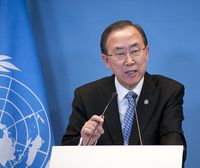Extensive UN plan for better global education to be launched

UN Secretary-General Ban Ki-moon announced a plan to face the global lack of education, specifically in low-income countries. Since people become more interdependent, the benefits of improvements in this area will be noticeable on an individual, a national and an international level. A commission developed a plan and published an associated report pointing out that more than 250 million children are out of school and 330 million are not achieving the most basic learning result.
The plan consists of four stages in order to generate reforms to increase the number of qualified high school graduates by 2030:
- Stage one is to have all countries adopting the reforms of the fastest improvers – the 25 per cent of education performers around the world. Instead of only one in 10 schools being online, all schools would go digital;
- Stage two of the plan is for every country to see education as an investment in the future and raise spending in low-income countries from three per cent of national income today to five per cent of national income;
- The third stage of the plan is mobilizing the combined resources of the international institutions. No country committed to reforming and investing should be denied the chance to deliver universal education for lack of funds; and
- Stage four calls for a Financing Compact between developing countries, donors and multilateral institutions under which overall aid will rise to $35 a year per child by 2030 – significantly less than $1 a week, hardly a wasteful use of the world's resources.
Ban-ki moon says the reforms and investments require the support of the global community for effective education system transformations. Otherwise, the global universal education will reach upper secondary level only by 2084 if the plan won’t be applied.
Editorial team (sz)
Sources
Photo credit: Ban Ki-moon bij Timmermans 1990 by Dutch Ministry of Foreign Affairs / CC BY-SA 2.0
Information source: UN.org